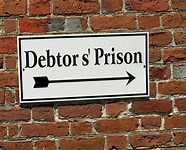Debtors Prison
Posted by Sandy on January 10, 2021 · Leave a Comment
Forgive me readers, I can’t seem to let 4919-20 go. It upsets me as much as the city not reaching an agreement with the Police and Fire Departments contract to insure they are not listed as #1 being the lowest paid in the Police Dept. in the County. Over 3 months without a contract and knowing James he wont allow their paycheck to be retroactive.
December 28,2020 City Commissioners passed Ordinance 4919-20 which regulates and prohibits certain conduct that would negatively affect the aesthetic beauty and the health, sanitation, and public safety of the City’s Downtown and Northwood Areas.
(1) prohibiting panhandling or soliciting in the Downtown and Northwood Areas:
While living in Florida I have never been approached by a homeless person asking for a handout. I am constantly approached by panhandlers holding their signs with their message and of course ends in “God Bless You” True story: A few years ago, it’s Christmas time I’m exiting 95 @ 45th. St. going home when I see 2 well dressed young (20-25) couple. She’s sitting on a suitcase and he’s holding a sign ” Trying to get home for Christmas.” I pulled over gave them a $20.00 bill and wished them well. A few day’s later coming off 95 at the end of the ramp there they are again, same couple, same suit case and sign. I pulled over exited the car and demanded my $20.00 back. Last I saw them they were running west on 45th. St. Panhandling can be seen daily on 45th. & Military. Same 4 people standing on the corners, same signs. The police must be working on the problem because the man that works daily @ Walmart has been missing lately, maybe he went home for Christmas.
(2) regulating sleeping and “camping” in those areas:
Homeless don’t have a place to lay their head at night. The lucky ones, if you can call them lucky, have a car where they sleep in the heat or cold. Talking about cold WPB had a temperature in the mid 40’s this week. Commissioners Neering and Peduzzi objected to section 2 and voted approval after they were assured it would be removed.
(3) prohibiting public indecency, public urination and public defecation.
Commissioner Shoaf mentioned she witnessed a man step outside of a bar and urinate in the alley. The city should have code enforcement check to insure that particular bar had restrooms. He has money to drink, he certainly can afford a $500.00 fine to avoid spending 60 day’s in jail.
 When I wrote that last line I was remembering the stories of “Debtor’s Prison” and went on the internet to investigate. Here’s what I found.
When I wrote that last line I was remembering the stories of “Debtor’s Prison” and went on the internet to investigate. Here’s what I found.
ACLU: “Debtor’s prisons were abolished in the United States in 1833. Until that time, failure to pay what you owed could and did land you in jail. Nearly two centuries ago, the United States formally abolished the incarceration of people who failed to pay off debts. Yet, recent years have witnessed the rise of modern-day debtors’ prisons—the arrest and jailing of poor people for failure to pay legal debts they can never hope to afford, through criminal justice procedures that violate their most basic rights.
A debtors’ prison is a prison for people who are unable to pay debt. Through the mid-19th century, debtors’ prisons (usually similar in form to locked workhouses) were a common way to deal with unpaid debt in Western Europe. Destitute persons who were unable to pay a court-ordered judgment would be incarcerated in these prisons until they had worked off their debt via labor or secured outside funds to pay the balance. The product of their labor went towards both the costs of their incarceration and their accrued debt. Increasing access and lenience throughout the history of bankruptcy law have made prison terms for unaggregated indigence obsolete over most of the world.”
Justipedia: “The incarceration of people who defaulted on their loans in debtors’ prison originated under the logic that punishing people for failure to pay their loans back would deter defaults. In debtors’ prison, however, there was no chance that the person could generate an income in order to pay back the loan.
Meanwhile, slavery became more and more socially disfavored. In the United States, slavery was defined as forced servitude. Once slavery was outlawed under this definition, debtors’ prison had to be outlawed too.”
When Did Slavery End? “On September 22, 1862, Lincoln issued a preliminary emancipation proclamation, and on January 1, 1863, he made it official that “slaves within any State, or designated part of a State…in rebellion,…shall be then, thenceforward, and forever free.”
So in closing I guess the homeless can be indecent, urinate and defecate in public–just not in the Downtown and Northwood Areas. Do I have that right?
30 years before the end of slavery the US ended Debtors Prison. When I’m feeling melancholy and wishing for the “good old days” I don’t mean back to the the eighteenth century.
The end
